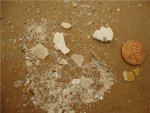Last summer a well-meaning friend  acid-washed our spa; the plaster on it (and the adjacent pool) are both about 6 or 7 years old. He did not dilute the acid; just poured it right over the plaster and hosed it off rather quickly afterwards.
acid-washed our spa; the plaster on it (and the adjacent pool) are both about 6 or 7 years old. He did not dilute the acid; just poured it right over the plaster and hosed it off rather quickly afterwards.
A few weeks later the plaster started flaking for about 2-3 months then seemed to stop for a while, then last night some more flakes occurred. It seems to happen or at least get worse when the spa heater is on. Attached is a photo I took this morning. You can see a couple of good-sized plaster chips; the yellowish ones seem to come from the heater (having been "baked" on one side?), and I'm not sure where the smaller pieces are from. Any suggestions?
And if it is indeed ruined and needs replastering, what is the expected cost for a 5' x 7' inground spa in Southern California?
Pool water test results:
FAC 3
TAC 3
pH 7.5
TA 100
CH 300
CYA 50
Salt 2700
Thanks and Happy New Year!
John
 acid-washed our spa; the plaster on it (and the adjacent pool) are both about 6 or 7 years old. He did not dilute the acid; just poured it right over the plaster and hosed it off rather quickly afterwards.
acid-washed our spa; the plaster on it (and the adjacent pool) are both about 6 or 7 years old. He did not dilute the acid; just poured it right over the plaster and hosed it off rather quickly afterwards.A few weeks later the plaster started flaking for about 2-3 months then seemed to stop for a while, then last night some more flakes occurred. It seems to happen or at least get worse when the spa heater is on. Attached is a photo I took this morning. You can see a couple of good-sized plaster chips; the yellowish ones seem to come from the heater (having been "baked" on one side?), and I'm not sure where the smaller pieces are from. Any suggestions?
And if it is indeed ruined and needs replastering, what is the expected cost for a 5' x 7' inground spa in Southern California?
Pool water test results:
FAC 3
TAC 3
pH 7.5
TA 100
CH 300
CYA 50
Salt 2700
Thanks and Happy New Year!
John


